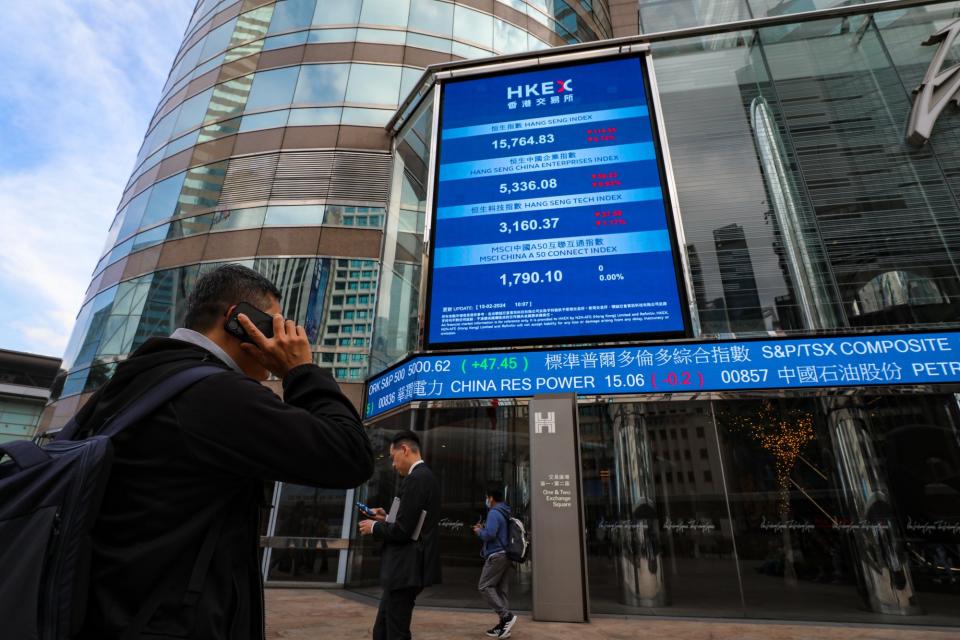Hong Kong stock exchange's 'double-dip' IPO reform gets few takers as investors shy away from listings
A recent Hong Kong Exchanges and Clearing (HKEX) measure that allows investors to "double dip", implemented as part of an attempt to revive the city's sluggish initial public offering (IPO) market, has received a negligible response.
Under the rule, existing shareholders and cornerstone investors of a new IPO applicant can subscribe for additional shares, or double dip, under certain conditions. The HKEX introduced the reform in November, around the same time it launched other measures, such as a digital IPO platform, to breathe life into the moribund primary market.
The move aims to encourage more companies to involve large-ticket or well-known investors, who are usually brought into the IPO process before the formal book-building process starts, to ensure a successful listing.
Do you have questions about the biggest topics and trends from around the world? Get the answers with SCMP Knowledge, our new platform of curated content with explainers, FAQs, analyses and infographics brought to you by our award-winning team.
However, amid sluggish IPO activity, the take-up rate has been minimal so far.

People pass under screens showing index and stock prices outside Exchange Square in Central, home of the city's bourse operator Hong Kong Exchanges and Clearing, on February 15, 2024. Photo: Sun Yeung alt=People pass under screens showing index and stock prices outside Exchange Square in Central, home of the city's bourse operator Hong Kong Exchanges and Clearing, on February 15, 2024. Photo: Sun Yeung>
In the first quarter of 2024, only one company, Beijing Health Guard Biotechnology, filed a waiver to use the rule change among 65 companies that sought listings on the mainboard, according to the Post's research.
Under the rule change, a company needs to demonstrate that its IPO meets the new size-based exemption conditions, which include the IPO size exceeding HK$1 billion (US$127.8 million) and that existing shareholders and cornerstone investors are not receiving preferential treatment via a waiver application.
Beijing Health Guard, which has developed a vaccine for human papillomavirus, is reportedly planning to raise between US$200 million and US$300 million.
"With the market being more challenging, cornerstone investors are now more selective with the deals they want to invest in," said John Lee, vice-chairman and co-head of Asia country coverage at UBS.
IPOs in the city declined 29 per cent year on year in the first quarter as the exchange continued to struggle to attract new listings, with 12 companies raising HK$4.73 billion, according to data compiled by London Stock Exchange Group.
Smaller IPO sizes may also be a factor in the low uptake of the double-dipping rule.
RoboSense Technology's US$135.7 million IPO in January ranks as the biggest in Hong Kong this year. Chinese payment provider Lianlian DigiTech, which debuted on HKEX last week, raised HK$657 million in its IPO, a fraction of the US$500 million it had originally planned in June 2023.
Alibaba Group Holding last week decided to withdraw the IPO application of its logistics unit, Cainiao Smart Logistics Network. It was one of the few blockbuster deals expected in the city, aiming to raise around US$1 billion last September.
The persistent market downturn is also putting off investors. The benchmark Hang Seng Index registered a 3 per cent decline in the first quarter after an unprecedented four-year slump. Index members are now trading at 8.76 times forward earnings on average, according to Bloomberg data, compared with the record high of 15.32 in February 2021. Cheap valuations are now prompting more companies to leave the city's exchange.
"In these kinds of down markets, it's quite difficult to ask investment funds, family offices, or high-net-worth individuals to participate as cornerstone investors," said Billy Au, a partner at Mayer Brown.
"Why do I take up the shares as a cornerstone investor at this point and be locked up for at least six months? It's quite difficult for investors to make such a decision. Why not just wait for the company to be listed, then see whether the valuation is justifiable in the secondary market?"
Investors who double dip could benefit as the additional shares they subscribe to are not subject to a six-month lock-up period.
"Affording such flexibility incentivises investors to commit early as cornerstone investors who will get an assured portion subject to disposal restrictions, but at the same time, [also get] a second bite of the cherry to participate in the placing tranche for additional shares, which can be traded immediately after the IPO closes," said Raymond Ng, a partner at law firm Harneys.
"This lowers execution risk and raises the success rate of an IPO."
Ng believes that the double-dip rule will attract more use when market conditions improve and demand for IPO shares increases.
An HKEX spokesperson said in a written response to the Post that the double-dipping reform aims to "provide more flexibility for independent investors to participate in IPOs, while striking an optimal balance between market facilitation and investor protection".
"HKEX is continuously working to deliver new initiatives and reforms, such as our new IPO settlement platform FINI and most recently our GEM reforms, to elevate the attractiveness and vibrancy of our listing franchise, whilst further enhancing our market infrastructure."
GEM is the exchange's second board, formerly known as Growth Enterprise Market.
This article originally appeared in the South China Morning Post (SCMP), the most authoritative voice reporting on China and Asia for more than a century. For more SCMP stories, please explore the SCMP app or visit the SCMP's Facebook and Twitter pages. Copyright © 2024 South China Morning Post Publishers Ltd. All rights reserved.
Copyright (c) 2024. South China Morning Post Publishers Ltd. All rights reserved.

 Yahoo Finance
Yahoo Finance 